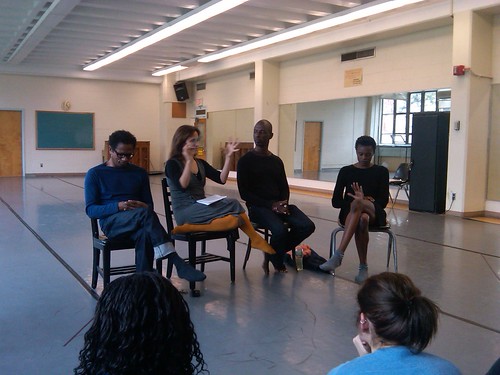As I rushed from Chemistry recitation over to Rathus Hall, which was incredibly hard for me to find, I wondered what Ralph would look like up close, and I was even more curious as to what he had to say regarding his own piece. Running down the stairs, I was stopped in the hallway because of a few people blocking the hallway. But, wait! They weren’t just any ordinary person! It was Ralph Lemon himself, as well as two of his dancers and Professor Profetta. I acted as though he was a true, famous celebrity and I felt my heart racing as I followed him into the dance studio, 101A.
When he took his shoes off, as well as the other dancers, I wondered if I was supposed to take mine off too, but I figured that it was just some weird dancer routine that I was unaware of, so I kept mine on. One of the first questions that came to my mind was, why is Professor Profetta not letting him speak? I was so eager to hear from Lemon himself. His piece left me in a “what the ****” state of mind, and I thought I would just leave it alone, but the piece wouldn’t leave me alone. I needed to understand what Lemon was attempting to show me, and I hoped to find that during the talk-session with him.
In the beginning of the talk, I noticed that many of my classmates were shuffling around a little, and that is probably because Professor Profetta, the dancers, and Ralph Lemon were all basically restating what we had already known from previous discussions on the piece. This made me want to get up and leave, but I didn’t want to be rude. I thought that I was giving up my free hour, where I could be eating and finishing up my chemistry labs just to restate the obvious. I thought that it wouldn’t be beneficial and it was just a waste of my time being there. But, my mind quickly changed.
When the audience sitting around Lemon and the others were asked to propose any questions, no matter the topic, to Lemon or his dancers, the talk became really interesting, in my opinion.
There were two professors in the audience and one of them continuously referred to Lemon’s piece as an “experiment,” which Lemon gladly accepted. His piece was indeed an experiment, an experiment between form and non form, the human body and its movements, as well as the possibilities and limits to which he could take this piece. Lemon really wanted to show what he was feeling, his grief, and this moment in his life. This piece was based on everything Lemon had been experimenting on in the past few years, and he thought it would be a good idea to put it together. Lemon even chuckled at the idea of calling “How Can You Stay in the House…” a piece because he felt as though it was unfinished and his experiment wasn’t really over. He even laughed at the idea of making his dancers do this nonstop because he still didn’t really achieve his goal.
One of the girls in our class mentioned that the dance was made without a structure. Okwui quickly responded to her comment by making it known that their dance, or whatever you wanna call it, was indeed structured. The dancers knew their timing: how long they must spin, how much time should elapse before they jump, when they had to “meet up” with each other again. So, the dance was indeed structured even though we thought that the majority of it was just improvised.
Another question that was brought up, which seemed to stunt our class’s minds, was: why put animals on the screen? I expected a really long response from Lemon with very intricate and detailed descriptions, but his answer was extremely simple. “The animals showed grace.” One question that I really was burning to ask is, why did he choose those animals in particular, but I felt that maybe I would be a little too repetitive. This idea of a moment of grace was really my favorite portion of the talk because he revealed something that I would have never thought about. The animals were indeed very graceful, after looking at chaos and listening to eight minutes of crying, they were peaceful.
Okwui also spoke about her crying book, and told us more about what it included like letters from Lemon’s deceased partner, news clippings, images, and poems. I found it to be amazing that she could just look at sad images and cry for eight minutes. She said that when she thought about crying, it was impossible for her to actually do it, but when she focused on the book itself and its contents, she found that place inside of her that helped her to let it all out.
One last thing that I found to be interesting was that Lemon mentioned that the dancers’ performances did not depend upon the audience’s reactions. The audience could have loved it, liked it, or hated it, but the performers weren’t trying to make them feel any sort of way so all of their responses were valid.
Ralph Lemon was extremely down to earth and he was really fun to talk to. The talk helped me to really get into Lemon’s mind and understand the meaning behind his work. I am extremely happy that I was able to meet Lemon in person, and I really hope that he uses children in his next piece. I finally understand…sorta.


